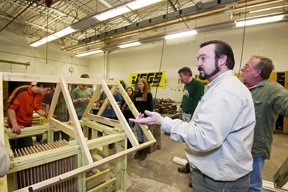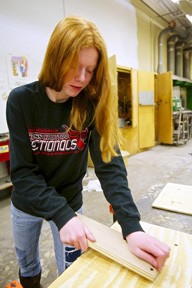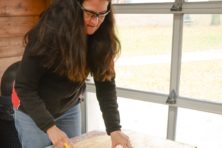Gibraltar Ecology Club Builds Bat Condos for Peninsula State Park
- Share
- Tweet
- Pin
- Share
The shop room at Gibraltar High School is noisy after the last bell on Thursday, Dec. 6, as Ecology Club members scrape, pound and saw.

Science teacher David Tupa takes time to teach Ecology Club students about bats and their preferred habitats.
The students, along with volunteers with Friends of Peninsula State Park, park naturalist Kathleen Harris and volunteer teachers David Tupa and Andy Stimers, are putting together two bat condos to shelter the park’s bats
“We’re making the bat condos as a way to give back and make Gibraltar a part of the community,” said sophomore Shelby Kahr.
The condos are big – each will end up 400 pounds, 16 square feet and will be raised 14 feet above the ground. They’ll be able to shelter about 2,400 bats each, and hopefully lure Peninsula State Park’s bat colonies out of the maintenance building attic and the crowded bats house at Welcker’s shelter, places they currently call home.
And hopefully the condos will lure Gibraltar Ecology Club students to the park to see their work, Tupa said.
“We do anything we can to get these kids into the environment,” Tupa said.
Before construction, the club hosted speakers to talk about bats, bat condos and white-nose syndrome, a fungus that has ravaged bat populations in much of the southern and eastern United States and Canada.
The fungus hasn’t made its way to Wisconsin yet, but if it does Harris said she wants to be ready. The condos can be easily dismantled and cleaned, so if the fungus shows up the condos can be disinfected.
Heather Kaarakka, the Department of Natural Resources conservation biologist coordinating the department’s bat roosting projects, said she wants to implement a citizen monitoring project where people will help track the park’s bats.
“We’re looking at what types and structures the bats are using, what species [are there], and ultimately how many bats are there over the course of the summer,” Kaarakka said.

Libby Glabe scrapes plywood to make a rough surface so bats can latch on. Photos by Len Villano.
And if white-nose syndrome flares, that information will be helpful for research on the fungus.
“White-nose syndrome doesn’t really affect bats into the summer, it primarily affects them during the winter when they go into hibernation,” Kaarakka said. “It will be good to watch these colonies over the next few years.”
The Ecology Club is also working on a project to bring more local – really local – food to Gibraltar School. Students are building a greenhouse in the school’s courtyard, where they plan to grow salad greens and herbs for the cafeteria.
Club members also do invasive species removal in Peninsula State Park, build birdhouses and spend occasional lunch hours learning about ecological issues.
But until the condos are built, painted and ready to be taken to the park, Ecology Club students will be in work mode. They’ll work among sawdust, laughter, scattered Gatorade bottles and Tupa’s quick lessons of bats and bat habitat, to give back to Door County’s human and animal communities.
“It’s nice to help with the community, to get together with people and to feel like you’re making a significant contribution to the park,” said sophomore Evan Board.

